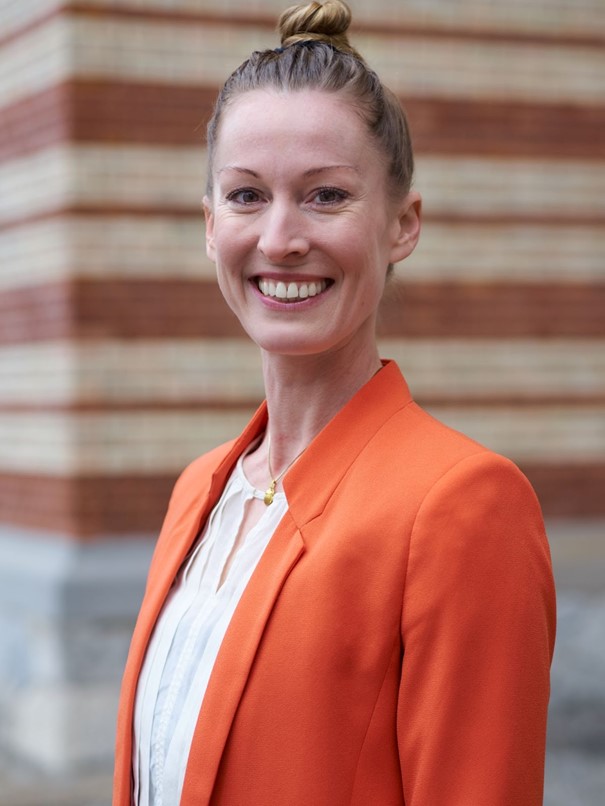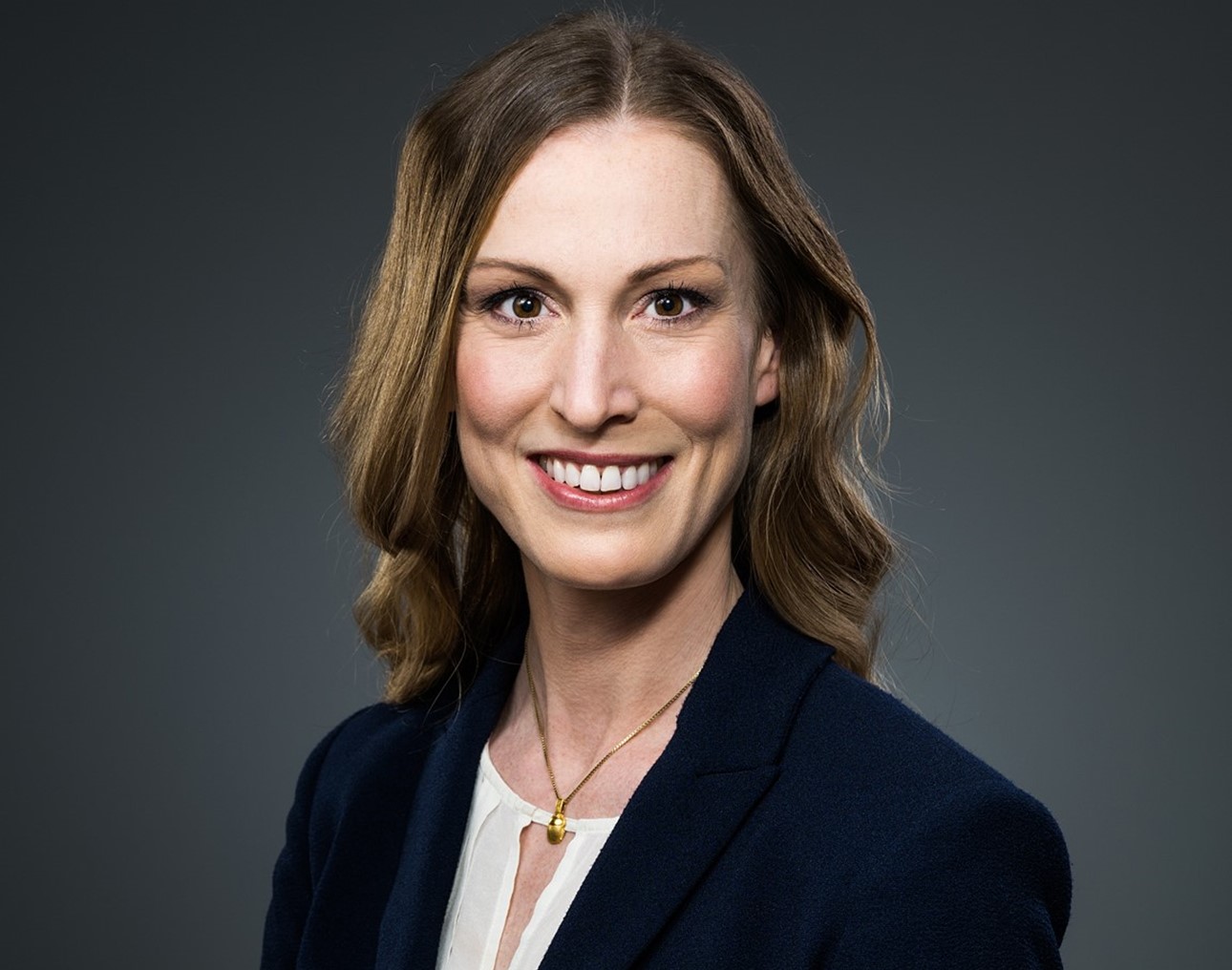Each month we have the honor of interviewing Women Who Inspire Us. This month we talked to Laura Köppen about her motivation to grow, learn and empower her team. We learned about her leadership style and how she fosters an environment of diversity and inclusion.
Laura, tell us a bit about yourself, your background, and your current position.
My name is Laura, I’m 37 years old, and I serve as the Head of the Department for Audience and a member of the Executive Board at SRF here in Zurich. I am a mother of three (ages 2 (twins) and 5). Originally from Germany, I moved to Switzerland a decade ago.
My academic background is in media management and intercultural communications, and I started my career at ZDF in Germany. I spent 6 years working in program strategy before shifting to audience research upon my move to Switzerland to join SRF. Since then, I’ve transitioned from a research and analytics expert role to a managerial role, eventually leading the team of audience researchers at SRF.
Three years ago, I was given the opportunity to become the Head of the Department and take a seat on the Executive Board.
Did you ever plan your career?
My career evolved organically, driven by my own aspirations. It wasn’t mere chance, but a result of my desire for change at certain junctures. Typically, every two or three years, I’d feel the need to learn and grow, propelling me to the next chapter of my career.
The move to Switzerland and SRF represented both a personal and professional pivot. At ZDF, I felt I had moved into a strategic and managerial role quite rapidly, so there came a point when I sought to delve deeper again. This urge for depth and new challenges eventually led me to SRF.
Did you have role models along your way?
Absolutely, and I continue to draw inspiration from them. My role models have always been individuals who dared to embrace risk and change. They were visionaries with a clear goal in mind. One of my initial bosses at ZDF exemplified this with his visionary approach and generous, positive attitude towards others. His influence inspired me to carry similar characteristics throughout my career.

As a leader, I strive to create an environment of honesty and psychological safety, fostering open communication. It’s crucial that our team not only works well together but also feels motivated to tackle complex issues.
What motivates you at work?
Two main factors drive my motivation: my team and the complexity of our work.
I’m fortunate to work with an incredibly intelligent and motivated group. Their energy is contagious, making our collaborative efforts enjoyable. In the past three years, our department had the privilege to experience fast growth. With every additional individual comes a chance to add plurality in perspectives. I’m a firm believer in the power of diversity, not just in terms of gender, but also in age, background, and interests. Diverse teams, in my experience, consistently outperform homogeneous ones. Yes, it presents challenges, as we must acknowledge and harness our differences, but this diversity is our strength.
As a leader, I strive to create an environment of honesty and psychological safety, fostering open communication. It’s crucial that our team not only works well together but also feels motivated to tackle complex issues.
In terms of complexity, I thrive in environments with complex problems, pressure, and uncertainty. Facing such challenges, where multiple solutions exist rather than a single clear path, motivates me.
What aspects of work are you the proudest of?
Two things stand out: Having the opportunity to actively shape both the transformation and the future of our public service media, as well as witnessing the growth of others. It’s truly rewarding to see my department improving day by day. Reflecting on where we were two years ago as a newly formed department, and comparing it to our accomplishments today, is astounding. It’s amazing to observe how each team member consistently gives their best, working together towards achieving our collective vision.
What do you think has been key to your success?
I attribute my success to a willingness to step forward when others hesitate. Whether it’s asking the first question in a silent room, or delivering a presentation no one else dares to, I’ve never been held back by fear.
This “leaning in” stems from my upbringing; they instilled in me the belief that I could achieve anything I set my mind to. As a curious child eager to learn and grow, I embraced every opportunity, which has been instrumental in reaching where I am today.
Did you ever had challenges on your journey or found yourself in an unfair position?
Certainly, there have been challenges and moments of unfairness.
Growing up, I lived in a bubble where diversity wasn’t a pressing issue for me. I believed in universal equality and never felt constrained by boundaries. However, entering the professional world, I was confronted with the reality that boundaries and inequality exist. I noticed decisions being made in predominantly male circles.
As I advanced in my career, the disparity became more apparent, which was frustrating, especially since I grew up believing I could achieve anything. For example, in leadership roles, men were typically at the forefront, while women often took secondary positions. This realization motivated me to strive for change and challenge these norms.
What is your leadership style? How did you develop it?
In leadership, it’s important not to conform to preconceived notions or expectations, especially as you enter your first leadership position. Find and refine your own style. Freeing myself from these expectations helped me grow into a more effective leader.
A book that influenced me is “Rethinking Organizations” by Frederic Laloux, which discusses self-organizing teams and redefines leadership roles. It inspired me to adopt a supportive leadership style, providing my team with the resources and freedom they need. I avoid micromanaging and focus on empowering them to make their own decisions confidently. Recognizing your boundaries and appreciating that others may excel in areas you don’t, is important for me.

Personally I adopt a supportive leadership style, providing my team with the resources and freedom they need. Recognizing your boundaries and appreciating that others may excel in areas you don’t, is important for me as a leader.
How do you observe leadership style in your surroundings?
At SRF, there’s a noticeable shift towards a more collaborative and supportive leadership style, and it’s not just among women. Many male colleagues also embrace this approach, fostering an environment where women feel encouraged to speak up and assert themselves. This allyship is vital for creating a psychologically safe space for all leaders. While some still adhere to traditional, authoritative styles, thanks to these allies I feel empowered to challenge such behavior when necessary.
And I see that, more and more, challenging traditional styles gets accepted.
We at Girls in Tech Switzerland are all about diversity. How do you promote diversity?
My commitment to diversity was reinforced during a coding boot camp I attended. I noticed the examples used were heavily male-oriented, which didn’t resonate with me. However, a project on the gender gap on the Titanic captivated me, illustrating how context can significantly impact engagement, which is something that I try to incorporate when I work with my team. Another realization was the challenge in recruiting women for technical roles. To address this, we began inviting more women to interviews, giving them the visibility they deserved and acknowledging the likelihood of underestimation in their applications. These steps are part of my active effort to enhance diversity and inclusion within my team. Additionally, I’m leading the “chance50:50” Initiative at SRF, inspired by the BBC. This project involves monitoring the gender balance of experts in interviews and documentaries to achieve equal representation.
What advice would you give to other women who want to work in tech?
Trust yourself and don’t hold back. You are just as capable as anyone else. Observe and understand the differences in how genders may communicate or behave, and decide how you want to engage in that context. But never shy away from being assertive, and believing in your abilities.
Was there anything you’d wish you had known earlier or would advise your younger self?
Yes, on several occasions, I was told that I appeared too dominant or too quick to voice my ideas, which I sensed had a gendered undertone. However, amidst this feedback, I received a valuable piece of advice: the importance of seeking to understand before being understood. Being reflective about your thoughts is always beneficial. So, I learned to take time for reflection, to consider alternatives before rushing with my initial ideas. This approach is something I actively encourage in myself and my team.
What is your next challenge ahead?
Professionally, my next challenge is to support my team as we navigate the complexities of a challenging market.
Personally, I aim to further the 50:50 initiative, expanding our network of diverse speakers in terms of gender, background, and more. We want to create a broader, more inclusive platform for experts and speakers.
And if you had enough money to retire, what would you be doing?
I would probably return to studying, as I deeply love learning. I’d likely delve into a more technical field, maybe even really immersing myself in coding.
Additionally, working with a startup appeals to me. There’s a certain drive in the startup culture to push global change that’s very inspiring. Though I contribute to change in my current role in a corporate context, the agility and impact of startups are particularly fascinating.
To conclude this interview, are there any readings that you can recommend in the context of diversity, empowerment or leadership?
Absolutely.
“Lean In” by Sheryl Sandberg is a classic and remains incredibly relevant. It encourages women to take their rightful place at the table.
Another insightful read is “Haltung Entscheidet” by Martin Permantier, though it’s only available in German. It encourages reflection on your attitudes and motivations. It’s about questions such as “Is it really about me right now?”, “Is it about us”, “Where are my feelings coming from”?
For diversity insights, “Dare to Lead” by Brené Brown is excellent. It delves into understanding and discussing fears and boundaries. It helped me to recognize and establish my own boundaries.
Thank you Laura for being a woman who inspires us! 💛
Author: Corinne Ruckstuhl
Women Who Inspire Us
Bilder 1 & 2: Copyright SRF/Oscar Alessio
Bild 3: Copyright privat/Matthias Dhum






